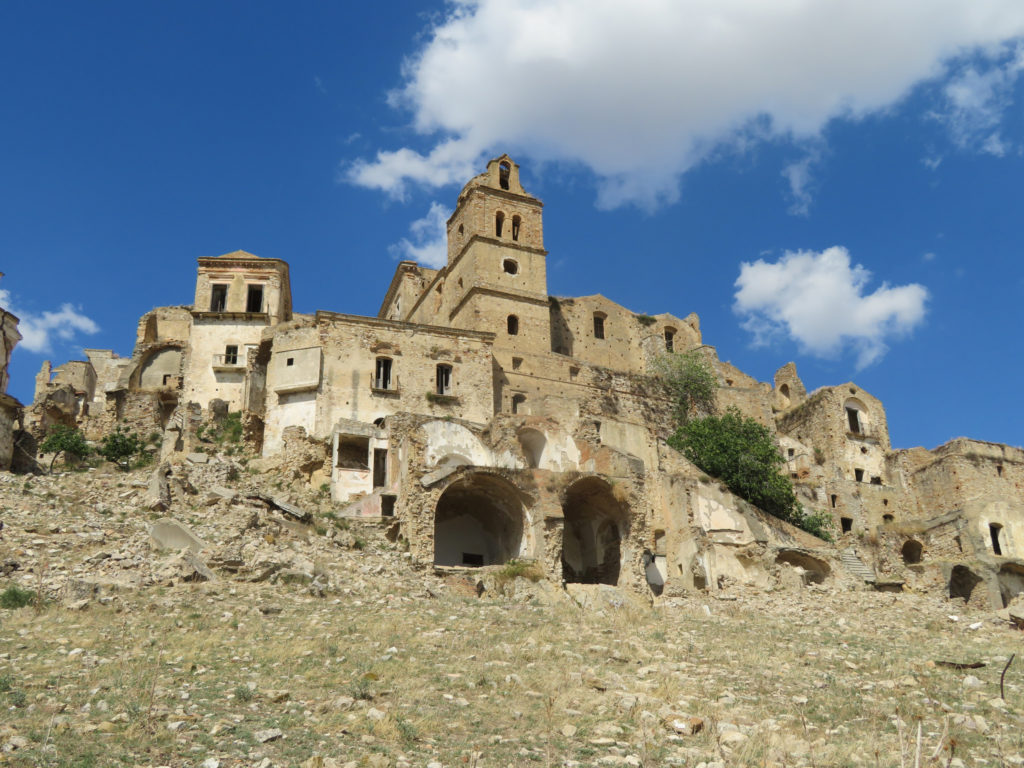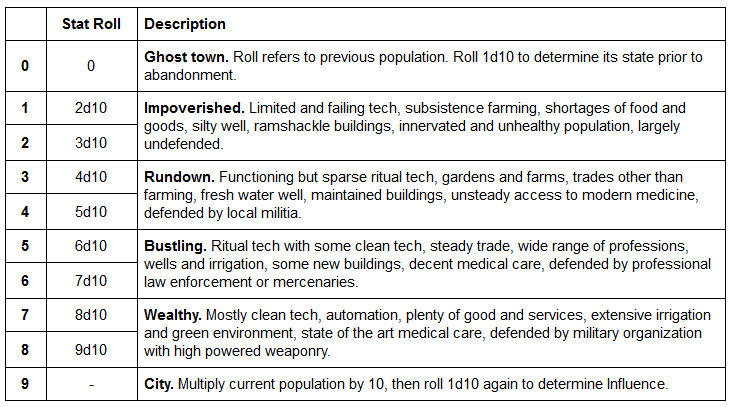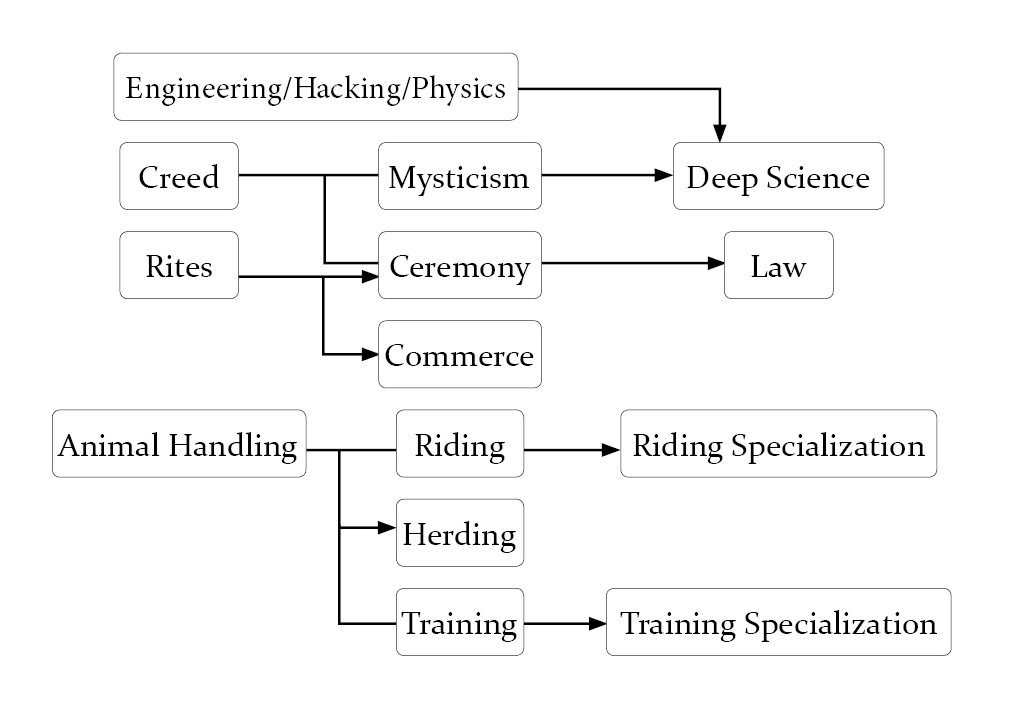Settlement Generation
I’ve been looking over classic Traveler system generation. It gets the job done, but the number of steps has me thinking about compressing as much information into rolls as possible during procedural generation. These tables are still probably for expediting prep rather than truly enabling at-the-table generation, but they might make things go faster and maybe encourage thinking about the ways different pieces of setting information are related.

Step One: Roll d100 to determine settlement population and reference the 1s place on the table below:

Step 2: Use the number of dice indicated in the “Stat Roll” column to roll the settlement’s stats: Influence, Intellect, and Combat. Whether or not a given stat is even or odd influences the character of the settlement. Also, the highest stat represents the background and affiliation of the town’s leadership. Tied stats represent a power struggle in the town.
- Influence: A representation of a settlement’s general health and prosperity. If there is uncertainty as to whether or not a good can be purchased or a service acquired, roll Influence. Influence leadership might be a mayor, a council, an elder, or a merchant.
- Even: the settlement is sympathetic to the Moon Court.
- Odd: the settlement is sympathetic to the Holy Ghost Brigade.
- Intellect: A representation of a settlement’s education and technology level. If there’s uncertainty as to whether or not a question can be answered, a technology repaired, or an expert found, roll Intellect. Intellect leadership might be a university, a lead researcher at a local research station, or a deep science cult.
- Even: Clean tech is favored and relatively easy to find. Ritual augmentation and deep science artifacts are frowned up to illegal.
- Odd: Ritual technology is favored and deep science is preferred. Even shadier ritual augmentation might get a pass, and artifacts are highly valued.
- Combat: represents the settlement’s security and military power. If there is a question as to whether not a settlement’s constabulary or military will show up in force, roll Combat. Combat leadership might be a noble and their knights ruling the settlement as their fief, a military garrison, or an unusually powerful sheriff.
- Even: The local constabulary and military align with the nominal ruler of the territory.
- Odd: law enforcement and military act in their own interest or the interests of someone other than the local government: the Holy Ghost Brigade, local bandits, themselves.
Stats can be used for conflict between settlements at scale; opposed Combat checks for armed conflicts or Intellect checks for espionage.
Also, failing a town stat roll should be complicating rather than terminating. If the players want to do some robbing and the village they’re in doesn’t yield anything suitable with an Influence roll, then maybe blowing a nearby bridge will fill the town up with laden caravans with nowhere to go (as opposed to a wealthier town where there might be a bank, ready to go).
Example Settlement
A couple of rolls gives us a settlement with 71 people. Rolling 2d10 for stats, that gives us a town with Influence 5, Intellect 15, and Combat 15 that has rebel sympathies, tolerates dubious deep technology, and is ruled by a military or law enforcement that is working in opposition to the standing local authority. Putting that together, we have…
The Village of Morrt
Influence 5, Intellect 15, and Combat 15
Morrt is a sprawl of shacks, dusty farms, and parched pastures. Travelers can get basic provisions and buy some water, but buying anything even a little expensive or unusual is going to be a longshot.
- Odd Influence: rebel sympathy. Villagers are poor and hostile to the Moon Court and its representatives. They might harbor a fugitive, lie to a government official, withhold taxes, kill a knight in their sleep, or rally around a charismatic bandit or rebel.
- Odd Intellect: deep science sympathy. A House of Iä cultist by the name of Yume lives in a shack at the edge of the village and has been proselytizing for a while. Nobody is likely to join the cult, but they are convinced in the utility of deep science. Villagers might scrape up money to send mercenaries on a vault expedition, look the other way if they see someone use a taboo ritual augmentation, or close their doors in the face of a Synod investigator.
- Combat Leadership – Odd Combat: Rogue governance. The town has a noncommittal militia and is effectively run by its captain, a farmer named Sartain. He and his inner circle are Holy Ghost Brigade spies, funneling information he receives as village head from the Court. He might ask sympathetic travelers to sabotage a Court expedition, kill a villager who is close to discovering the truth, or stage a coup to formally declare Morrt a HGB town.
Skills
Padding out the skill list for a largely terrestrial game where access to technology is limited and working animals are common. Also, a lot of skills on the rules-as-written list aren’t useful, since space is probably going to be very hard to get into. For the social skills, I tried to tie them specifically into areas of expertise (knowledge of etiquette and legal precedent) rather than making them extensions of a non-existent Charisma stat (Persuasion, Deception, etc). I think it fits better with the spirit of the game and might open up some interesting dynamics.

Animal Handling is getting animals to do want you want within the bounds of their behavior and intelligence.
Ceremony is knowing of the lives and sayings of saints, poets, knights, and kings. If you want to convince someone of something based on precedent or decorum, Ceremony helps. It also lets you officiate things like weddings, funerals, christenings, etc.
Commerce is appraising the value of goods, knowing if you’re being cheated, finding a buyer, and getting a good price.
Creed is a replacement for Theology, representing a general knowledge of all the various religions and esoteric beings that proliferate in the desert. It probably specializes based on major religion or religion type, but I’m not that far yet.
Deep Science is knowledge of the impossible alien technology buried in vaults across the system. Working directly with deep tech will almost eventually turn you into something bad eventually, but a deep science check to study somewhat more conventional ritual technology will let you bypass the normal penalties (i.e. disadvantage on working with it unless you designed or built it yourself).
Herding is working with herd animals, getting them where you want them safely and quickly, knowing when they’re sick, reading their behavior, and so on.
Rites is a skill, representing knowledge of ettiquette for greetings, farewells, insults, haggling, marriages, funerals, alliances, and the like. If you want to suck up to someone by showing respect or a willingness to play by the rules, Rites helps.
Law represents knowledge of legal precedent and taboos. It lets you represent yourself or others in a trial and conduct a trial if all involved parties agree.
Riding is riding on animals. Driving still applies to things like carts and carriages–if you’re on an animal’s back, it’s riding.
Riding Specialization applies to a particular animal, like emperor mantis nymphs, camels, or elephant crabs.
Training is training and taming animals, as well as getting trained animals to actually follow their training.
